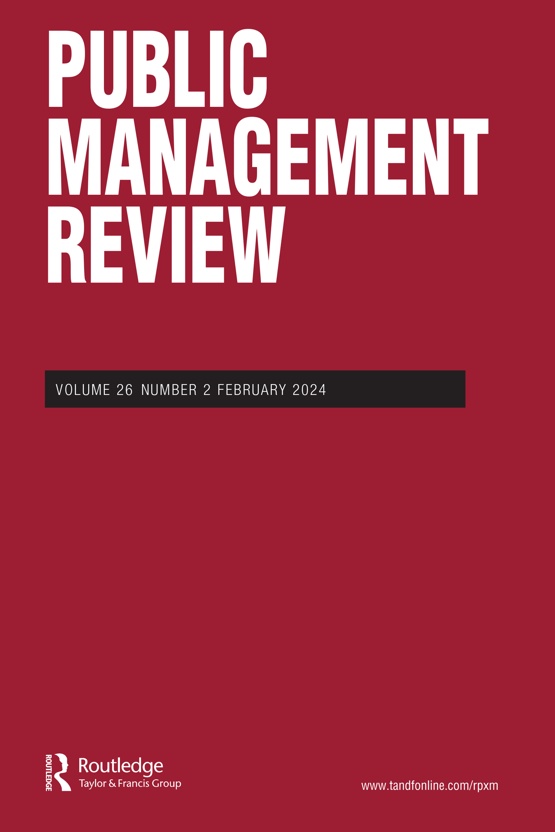Submit a Manuscript to the Journal
Public Management Review
For a Special Issue on
Intermunicipal And Regional Cooperation And Community Based Outcomes
Abstract deadline
28 February 2024
Manuscript deadline
31 July 2024

Special Issue Editor(s)
Hugo Consciência Silvestre,
Universidade da Integração Internacional da Lusofonia Afro-Brasileira (UNILAB)/Brazil
[email protected]
Eduardo Grin,
Fundação Getúlio Vargas/Brazil
[email protected]
Claudia Avellaneda,
Paul H. O'Neill Professor and Faculty Fischer Fellow at Indiana University/United States
[email protected]
Ricardo Gomes,
Fundação Getúlio Vargas/Brazil
[email protected]
Rui Cunha Marques,
IST/University of Lisbon/Portugal
[email protected]
Intermunicipal And Regional Cooperation And Community Based Outcomes
We invite paper proposals for this special issue in the Public Management Review.
This special edition aims to advance the discussion on how intermunicipal and regional cooperation can generate community-based outcomes. Public cooperation has become the toll for administrative reform for public organizations (Aldag, et al 2020). This is a mechanism aimed at addressing resource dependency while mitigating transaction costs for public services delivery improvements (Bèl & Elston, 2023). Given shared economic, demographic, and social problems, cooperation between local and/or regional governments can be an efficient collective action tool to overcome such constraints (e.g., Wang & Ran, 2021; Warner, et al 2020). Studies on public cooperation have also been focusing on the analysis of intermediary outcomes, such as cost efficiency or cost reduction (Bèl & Warner, 2016). Overall, these studies find mixed effects on intermediary outcomes, something that is dependent from the sector to be analyzed (Aldag, et al. 2020) or public unit elements misdiagnosing (Elston, et al 2023).
However, a significant gap exists in the public administration and management (PAM) literature about the impacts on communities originated by intermunicipal or regional cooperative arrangements, even though this topic is starting to gain increasing attention from policymakers, practitioners, and academics. This gap is the focus of this CFPs. Siciliano, et al. (2022) report that researchers still need to conduct studies on public cooperation in relation to final or community-based outcomes (Cristofoli & Macciò, 2017). These are those outcomes associated with the effects of public services on communities, such as reducing crime rates, promoting economic development, improving conditions for the homeless, or enhancing health status.
We believe that actors in the field of PAM would benefit substantially from a more systematic incorporation of the analysis of public cooperation’s community-oriented impacts. We ask: ‘What are the main elements, factors, or dimensions of inter-municipal/regional cooperation that influence community outcomes?
Considering this research question, it is equally possible that cooperation can also be harmful in producing solutions for local or regional communities – and vice versa. Such results can occur when cooperation leads to the duplication of service provision methods (Chen & Thurmaeir, 2009), coordination challenges (Carr & Hawkins, 2013) and/or fails to serve as a substitute or complementary tool (Scorsone, 2006).
With this Special Issue, we aim to fill this gap in the literature on public cooperation. The editors encourage submissions that address the following themes, though other perspectives will be welcome:
- Community-based outcomes resulting from intermunicipal and regional cooperation.
- Strategies and policy designs for intermunicipal and regional cooperation.
- Factors that explain success or failure in generating community-based outcomes (e.g. state capacities, mutual trust between entities, social capital, transaction costs, achieved economies of scale, among other factors).
- The institutional characteristics of intermunicipal and regional cooperation and the path to successful community-based outcomes.
- The role of social/third sector organizations or other stakeholders in supporting intermunicipal and regional cooperation to implement public policies and achieve societal impacts.
- Comparisons between arrangements of intermunicipal, and regional cooperation, whether in different policy sectors, regions, or countries.
- The limitations and possibilities of intermunicipal, and regional cooperation to achieve community-based outcomes.
- The ‘dark side’ of such cooperation.
Papers must have a theoretical contribution to the PAM literature and can be conceptual or empirical. Submissions are welcome from both new and established researchers. Systematic literature reviews are permissible but only if they make a clear contribution to advancing theory rather than solely describing existing theory.
Research strategies can include, inter alia, single case studies, comparative research based on multi-case analysis or panel designs, quantitative investigations demonstrating societal outcomes and their explanatory variables, and qualitative work based on interviews with social actors and stakeholders. Ultimately, all papers should contribute to the theoretical testing or development of intermunicipal/regional cooperation and its final societal impacts.
Looking to Publish your Research?
Find out how to publish your research open access with Taylor & Francis Group.
Choose open accessSubmission Instructions
The deadline for submitting a 1,500-word summary to the guest editor for the initial screening of topics and approaches is on the 28th of February, 2024. Authors will be informed of the editorial decision within four weeks. All editorial decisions are final.
Timeline for submissions
28th February 2024 – Submission of initial proposals
31st March 2024 – feedback from the editors on proposals
31st July 2024 – deadline for submission of the full papers
31st October – feedback from the reviewers on the full papers after the review process
31st January 2025 – submission of final papers for publication
Subject to the peer review process, accepted papers will be published online as they are accepted with ‘hard copy’ publication approximately twelve months after acceptance of the final paper.
Submission process
The submission of the full paper through the online PMR Scholar One system for peer review.
Corresponding editor for all communication
Hugo Consciência Silvestre - corresponding editor: [email protected]